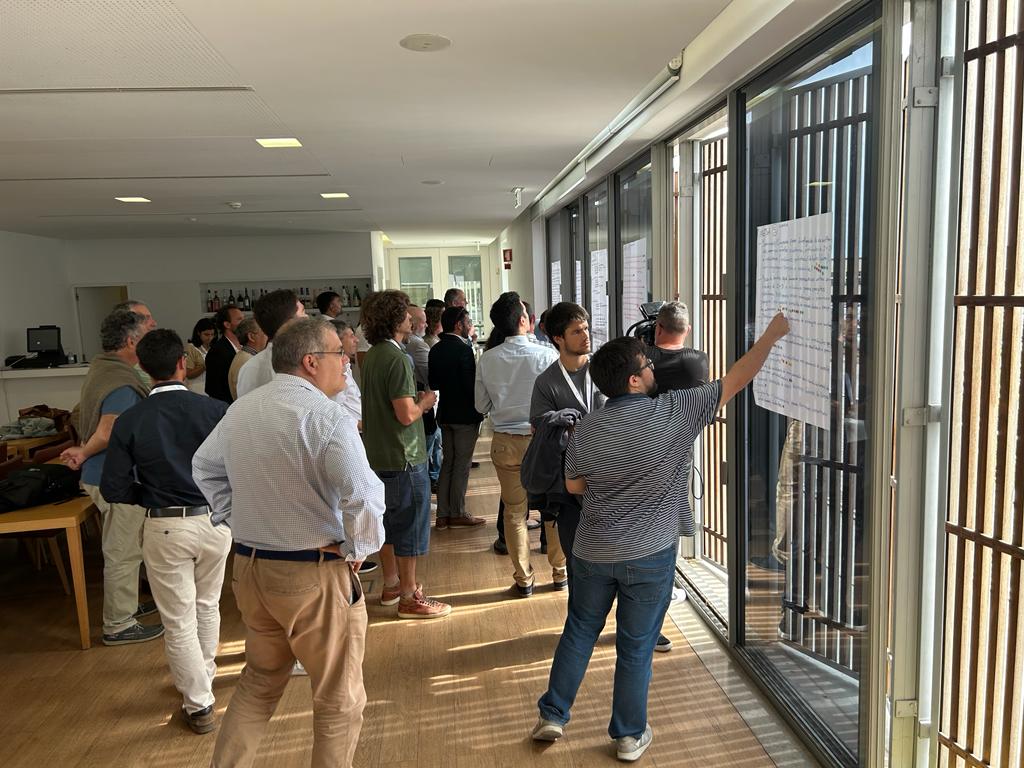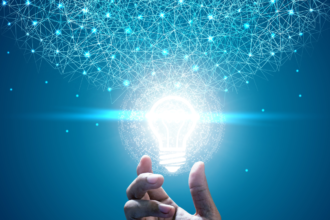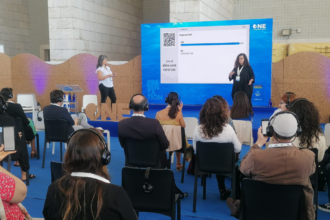Over 60 actions proposed to transform Portuguese Aquaculture
A group of actors connected to the aquaculture sector in Portugal gathered at the World Café “Aquaculture for the Future We Want” to discuss and propose actions that promote sustainability, competitiveness, and diversification of the sector. In a total of five round tables and five questions in the areas of sustainability and animal welfare, licensing, competitiveness and investment, communication, and science and innovation, over 60 specific actions were proposed for the transformation of the national aquaculture industry.
The meeting, held at the School of Hotel Management in Setúbal on May 26th, involved representatives from companies, research and development centers, and various key stakeholders in the sector. The main objective of the World Café, part of the 23rd Congress of the Portuguese Aquaculture Association (APA), was to identify and discuss the necessary transformations to drive the industry forward, as well as propose concrete actions that contribute to its development.
The World Café is a methodology for dialogue and participation that promotes collaboration and the exchange of ideas among participants. In an informal and learning environment, participants have the opportunity to move around discussion tables and, with the support of moderators, debate different topics and propose concrete actions. This dynamic allows for the sharing of ideas and the collective construction of a common vision, in an environment where all opinions have equal value.
During the World Café, five discussion tables were organized to address different subtopics relevant to aquaculture in Portugal. Participants debated and proposed a total of 62 actions aimed at addressing the challenges and opportunities faced by the sector.
In the end, participants voted for the actions they considered most important. By theme, these are the actions that received the most votes:
→ Sustainability, environmental and economic performance, animal health and welfare:
- Create tax incentives for the adoption of greener resources and tax incentives for compliant companies.
- Communicate widely to various audiences about production methods and product origin.
- Invest in more sustainable, local, and functional ingredients in feed.
→ Licensing, spatial planning, and regulatory framework:
- Create an intermediary body that streamlines, monitors, and supports companies.
- Review and plan the territory to ensure better characterization of production areas in terms of investment size, potential species to be produced, environmental carrying capacity, and accessibility.
- Enhance the technical skills of public entities responsible for licensing.
→ Competitiveness, investment, diversification, certification, and value-added:
- Invest in processing (filleting, packaging, presentation).
- Invest in differentiating national offerings through quality seals.
- Invest in market research.
→ Communication and social acceptance:
- Incorporate aquaculture-related educational content in school settings.
- Create labels for products with additional information beyond the country of production.
- Focus on media communication.
→ Science and Innovation:
- Create a database that promotes partnerships between R&D institutions and industry.
- Organize technical visits by researchers to aquaculture facilities.
- Hold seminars/congresses to disseminate results among academia, R&D institutions, and industry.
The results reflect the commitment of various actors in the Portuguese aquaculture sector to promote sustainability and competitiveness, and will be integrated into a more comprehensive document about the current state of the sector, considering not only the perspective of producers but also the perception of government officials, consumers, the general public, the scientific community, and environmental associations.
The World Café “Aquaculture for the Future We Want” was jointly organized by the APA and for the first time involved all Collaborative Laboratories linked to the blue economy, namely +ATLANTIC, B2E CoLAB, GreenColab, S2Aqua, and Fórum Oceano.
About APA: The Portuguese Aquaculture Association (APA) represents 90 percent of the Portuguese aquaculture sector.
About +ATLANTIC: The +ATLANTIC CoLAB is a Portuguese non-profit Collaborative Laboratory that designs and provides knowledge-based products and services related to various fields of the blue economy, ocean sustainability, marine sciences, ecosystem health, climate change, ocean literacy, and science communication. Its multidisciplinary team uses numerical modeling, remote sensing, data science, artificial intelligence, and ocean and space technologies to design these products and services and collaborate on national and international projects.
About B2E CoLAB: The B2E Collaborative Laboratory for the Blue Bioeconomy, based at UPTEC Mar in Matosinhos, is a non-profit private association of universities, research centers, and private companies guided by principles of circularity, sustainability, and social responsibility. The association, focused on Blue Biotechnology, operates in the areas of sustainable aquaculture, marine biotechnology, and valorization of living marine resources, with the aim of developing innovative solutions that contribute to the construction of a greener and more resilient value-added economy.
About Fórum Oceano: Fórum Oceano is the management entity of the Portuguese Sea Cluster, certified and recognized by the Ministry of Economy and the Sea. It is a non-profit organization whose mission is to promote and enhance the maritime economy in Portugal by supporting the sustainable development of the maritime sector, promoting innovation, entrepreneurship, and cooperation among sector entities. To achieve this, it develops various initiatives and projects aimed at strengthening the competitiveness of companies and institutions operating in the maritime economy.
About GreenCoLab: GreenCoLab is a non-profit private organization, a collaborative platform between research and industry, whose research and innovation agenda is based on the exploration of micro and macroalgae as essential components for the food, feed, nutraceutical, bioenergy, wastewater, and cosmetics industries.
About S2Aqua: Established in 2021, S2AQUAcoLAB is a non-profit private institution that seeks to elevate Aquaculture to a new level. With a network of 16 partners and 49 qualified researchers, its main objectives include promoting sustainable, intelligent, and innovative solutions for the sector. These objectives include optimizing production, identifying health bioindicators, adapting production systems to climate change, and driving technological development. S2AQUAcoLAB also focuses on knowledge transfer and strategic cooperation with its partners to transform Aquaculture into a stronger and more capable industry.
A group of actors connected to the aquaculture sector in Portugal gathered at the World Café “Aquaculture for the Future We Want” to discuss and propose actions that promote sustainability, competitiveness, and diversification of the sector. In a total of five round tables and five questions in the areas of sustainability and animal welfare, licensing, competitiveness and investment, communication, and science and innovation, over 60 specific actions were proposed for the transformation of the national aquaculture industry.
The meeting, held at the School of Hotel Management in Setúbal on May 26th, involved representatives from companies, research and development centers, and various key stakeholders in the sector. The main objective of the World Café, part of the 23rd Congress of the Portuguese Aquaculture Association (APA), was to identify and discuss the necessary transformations to drive the industry forward, as well as propose concrete actions that contribute to its development.
The World Café is a methodology for dialogue and participation that promotes collaboration and the exchange of ideas among participants. In an informal and learning environment, participants have the opportunity to move around discussion tables and, with the support of moderators, debate different topics and propose concrete actions. This dynamic allows for the sharing of ideas and the collective construction of a common vision, in an environment where all opinions have equal value.
During the World Café, five discussion tables were organized to address different subtopics relevant to aquaculture in Portugal. Participants debated and proposed a total of 62 actions aimed at addressing the challenges and opportunities faced by the sector.
In the end, participants voted for the actions they considered most important. By theme, these are the actions that received the most votes:
→ Sustainability, environmental and economic performance, animal health and welfare:
Create tax incentives for the adoption of greener resources and tax incentives for compliant companies.
Communicate widely to various audiences about production methods and product origin.
Invest in more sustainable, local, and functional ingredients in feed.
→ Licensing, spatial planning, and regulatory framework:
Create an intermediary body that streamlines, monitors, and supports companies.
Review and plan the territory to ensure better characterization of production areas in terms of investment size, potential species to be produced, environmental carrying capacity, and accessibility.
Enhance the technical skills of public entities responsible for licensing.
→ Competitiveness, investment, diversification, certification, and value-added:
Invest in processing (filleting, packaging, presentation).
Invest in differentiating national offerings through quality seals.
Invest in market research.
→ Communication and social acceptance:
Incorporate aquaculture-related educational content in school settings.
Create labels for products with additional information beyond the country of production.
Focus on media communication.
→ Science and Innovation:
Create a database that promotes partnerships between R&D institutions and industry.
Organize technical visits by researchers to aquaculture facilities.
Hold seminars/congresses to disseminate results among academia, R&D institutions, and industry.
The results reflect the commitment of various actors in the Portuguese aquaculture sector to promote sustainability and competitiveness, and will be integrated into a more comprehensive document about the current state of the sector, considering not only the perspective of producers but also the perception of government officials, consumers, the general public, the scientific community, and environmental associations.
The World Café “Aquaculture for the Future We Want” was jointly organized by the APA and for the first time involved all Collaborative Laboratories linked to the blue economy, namely +ATLANTIC, B2E CoLAB, GreenColab, S2Aqua, and Fórum Oceano.
About APA: The Portuguese Aquaculture Association (APA) represents 90 percent of the Portuguese aquaculture sector.
About +ATLANTIC: The +ATLANTIC CoLAB is a Portuguese non-profit Collaborative Laboratory that designs and provides knowledge-based products and services related to various fields of the blue economy, ocean sustainability, marine sciences, ecosystem health, climate change, ocean literacy, and science communication. Its multidisciplinary team uses numerical modeling, remote sensing, data science, artificial intelligence, and ocean and space technologies to design these products and services and collaborate on national and international projects.
About B2E CoLAB: The B2E Collaborative Laboratory for the Blue Bioeconomy, based at UPTEC Mar in Matosinhos, is a non-profit private association of universities, research centers, and private companies guided by principles of circularity, sustainability, and social responsibility. The association, focused on Blue Biotechnology, operates in the areas of sustainable aquaculture, marine biotechnology, and valorization of living marine resources, with the aim of developing innovative solutions that contribute to the construction of a greener and more resilient value-added economy.
About Fórum Oceano: Fórum Oceano is the management entity of the Portuguese Sea Cluster, certified and recognized by the Ministry of Economy and the Sea. It is a non-profit organization whose mission is to promote and enhance the maritime economy in Portugal by supporting the sustainable development of the maritime sector, promoting innovation, entrepreneurship, and cooperation among sector entities. To achieve this, it develops various initiatives and projects aimed at strengthening the competitiveness of companies and institutions operating in the maritime economy.
About GreenCoLab: GreenCoLab is a non-profit private organization, a collaborative platform between research and industry, whose research and innovation agenda is based on the exploration of micro and macroalgae as essential components for the food, feed, nutraceutical, bioenergy, wastewater, and cosmetics industries.
About S2Aqua: Established in 2021, S2AQUAcoLAB is a non-profit private institution that seeks to elevate Aquaculture to a new level. With a network of 16 partners and 49 qualified researchers, its main objectives include promoting sustainable, intelligent, and innovative solutions for the sector. These objectives include optimizing production, identifying health bioindicators, adapting production systems to climate change, and driving technological development. S2AQUAcoLAB also focuses on knowledge transfer and strategic cooperation with its partners to transform Aquaculture into a stronger and more capable industry.





